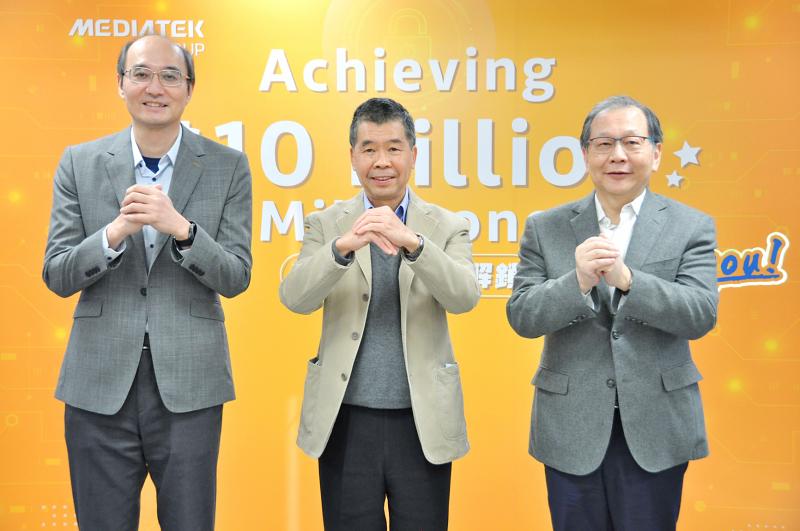MediaTek Inc (聯發科) yesterday announced it would give incentive bonuses totaling NT$1.7 billion (US$59.7 million) to its employees and those at the firm’s major subsidiaries, after the smartphone chip supplier’s revenue hit US$10 billion last year.
This is the biggest incentive bonus the Hsinchu-based handset chip designer has ever distributed in its 23-year history.
About 17,000 full-time employees of MediaTek and five of its subsidiaries, including Richtek Technology Corp (立錡科技) and Airoha Technology Corp (絡達科技), would receive a “red envelope” of NT$100,000 each, the company said.

Photo courtesy of MediaTek Inc
“Surpassing US$10 billion is just the beginning. We will continue to [grow] on this basis,” MediaTek said in a statement.
MediaTek, which has about 10,000 employees in Taiwan, said it has also allocated 20 percent of its annual distributable earnings for local employees’ year-end bonuses.
MediaTek posted NT$322.15 billion in consolidated revenue last year, up 30.84 percent from NT$246.22 billion in 2019, a record for the company, as its 5G smartphone chips were adopted by a growing number of vendors.
LG Electronics Co and Chinese smartphone vendors, including Realme Mobile Telecommunications (Shenzhen) Co (銳爾覓移動通信), Xiaomi Corp (小米), Vivo Communication Technology Co (維沃) and Oppo Mobile Telecommunications Corp (歐珀), use MediaTek’s 5G Dimensity chips in their latest handsets.
MediaTek last quarter overtook Qualcomm Inc as the world’s biggest smartphone chipset supplier for the first time, as its affordable chips gained traction in emerging markets, a tally by market researcher Counterpoint showed.

South Korea’s equity benchmark yesterday crossed a new milestone just a month after surpassing the once-unthinkable 5,000 mark as surging global memory demand powers the country’s biggest chipmakers. The KOSPI advanced as much as 2.6 percent to a record 6,123, with Samsung Electronics Co and SK Hynix Inc each gaining more than 2 percent. With the benchmark now up 45 percent this year, South Korea’s stock market capitalization has also moved past France’s, following last month’s overtaking of Germany’s. Long overlooked by foreign funds, despite being undervalued, South Korean stocks have now emerged as clear winners in the global market. The so-called “artificial intelligence

CONFUSION: Taiwan, Japan and other big exporters are cautiously monitoring the situation, while analysts said more Trump responses ate likely after his loss in court US trading partners in Asia started weighing fresh uncertainties yesterday after President Donald Trump vowed to impose a new tariff on imports, hours after the Supreme Court struck down many of the sweeping levies he used to launch a global trade war. The court’s ruling invalidated a number of tariffs that the Trump administration had imposed on Asian export powerhouses from China and South Korea to Japan and Taiwan, the world’s largest chip maker and a key player in tech supply chains. Within hours, Trump said he would impose a new 10 percent duty on US imports from all countries starting on

STRATEGIC ALLIANCE: The initiative is aimed at protecting semiconductor supply chain resilience to reduce dependence on China-dominated manufacturing hubs India yesterday joined a US-led initiative to strengthen technology cooperation among strategic allies in a move that underscores the nations’ warming ties after a brief strain over New Delhi’s unabated purchase of discounted Russian oil. The decision aligns India closely with Washington’s efforts to build secure supply chains for semiconductors, advanced manufacturing and critical technologies at a time when geopolitical competition with China is intensifying. It also signals a reset in relations following friction over energy trade and tariffs. Nations that have joined the Pax Silica framework include Japan, South Korea, the UK and Israel. “Pax Silica will be a group of nations

Chinese artificial intelligence (AI) start-up DeepSeek’s (深度求索) latest AI model, set to be released as soon as next week, was trained on Nvidia Corp’s most advanced AI chip, the Blackwell, a senior official of US President Donald Trump’s administration said on Monday, in what could represent a violation of US export controls. The US believes DeepSeek will remove the technical indicators that might reveal its use of American AI chips, the official said, adding that the Blackwells are likely clustered at its data center in Inner Mongolia, an autonomous region of China. The person declined to say how the US government received